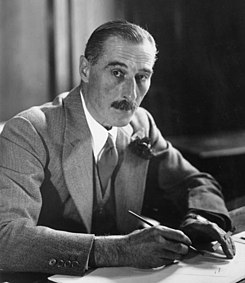Nevile Henderson
|
Sir Nevile Henderson |
|
|---|---|

Ambassador Henderson in office, May 1937
|
|
| Envoy Extraordinary and Minister Plenipotentiary to the Kingdom of Yugoslavia | |
|
In office 21 November 1929 – 1935 |
|
| Monarch | George V |
| Prime Minister | Ramsay MacDonald |
| Preceded by | Howard William Kennard |
| Succeeded by | Ronald Ian Campbell (1939) |
| Ambassador to Argentina | |
|
In office 1935–1937 |
|
| Monarch |
George V (1935–36) Edward VIII (1936) George VI (1936–37) |
| Prime Minister | Stanley Baldwin |
| Preceded by | Henry Chilton |
| Succeeded by | Esmond Ovey |
| Ambassador Extraordinary and Plenipotentiary to Germany | |
|
In office 28 May 1937 – 7 September 1939 |
|
| Monarch | George VI |
| Prime Minister | |
| Preceded by | Eric Phipps |
| Succeeded by | Brian Robertson (1949) |
| Personal details | |
| Born |
10 April 1882 Sedgwick, Sussex, England |
| Died |
30 December 1942 (aged 60) |
| Nationality | British |
| Political party | Conservative |
30 December 1942 (aged 60)
London, England
Sir Nevile Meyrick Henderson GCMG (10 June 1882 – 30 December 1942) was a British diplomat and Ambassador of the United Kingdom to Nazi Germany from 1937 to 1939.
He was born at Sedgwick Park near Horsham, Sussex, the third child of Robert and Emma Henderson.
He was educated at Eton and joined the Diplomatic Service in 1905. He served as an envoy to France in 1928/29 and as Envoy Extraordinary and Minister Plenipotentiary to the Kingdom of Yugoslavia between 1929 and 1935, where he was in close confidence with King Alexander and Prince Paul. In 1935 he became Ambassador to Argentina before on 28 May 1937 he was appointed Ambassador in Berlin.
A believer in appeasement policies, Henderson thought Hitler could be controlled and pushed toward peace and cooperation with the Western powers. In February 1939, he cabled the FCO in London:
If we handle him (Hitler) right, my belief is that he will become gradually more pacific. But if we treat him as a pariah or mad dog we shall turn him finally and irrevocably into one.
Henderson was ambassador at the time of the 1938 Munich Agreement, and counselled Prime Minister Neville Chamberlain to enter into it. Shortly thereafter, he returned to London for medical treatment, returning to Berlin in ill-health in February 1939 (he would die of cancer less than four years later).
...
Wikipedia
